Disclaimer: this is an advertisement.
Use the right tool to get the job done right. Golf clubs aren't just equipment, they're tools. And to get the job done right, you have to select the right clubs.
There's an old proverb: "If the axe is not sharp, it doesn't matter how hard the wood is." And in golf, if the club isn't right, it doesn't matter how good the player is, how difficult the course is, how nice the weather is, or anything else. The job won't get done right. With the wrong clubs, even Tiger Woods would have trouble.
Speaking of woods, Cleveland golf offers a wide selection of golf drivers. And once you get to the green, they have a number of golf putters available.
You wouldn't use a screwdriver to drive a nail into a wall. You wouldn't use a wrench to check your tire pressure. So why would you use the wrong tools when you golf?
Friday, June 29, 2012
New England Warrior Benefit
On July 3rd the Seaport World Trade Center will be hosting the New England Warrior Benefit to Support Families of Fallen and Wounded U.S. Special Operations Troops .
"The New England Warrior Benefit will bring together the nation's most celebrated military leaders and region's top influencers for a fundraising gala for five non-profit benevolent organizations that provide critical support and financial assistance to the children, spouses and parents of our elite service members, who routinely perform dangerous acts of valor to preserve and protect the American way of life. "
The five non-profit organizations are:
The Navy SEAL Foundation
The Wounded Warrior Project
The Special Operations Warrior Foundation
The Semper Fi Fund
No Greater Sacrifice
Senator Scott Brown and Mayor Menino will be in attendance, along with numerous esteemed guests as well as servicemen and women.
"The evening's fundraising celebration will be complemented by a one-of-a-kind online auction, featuring five hand-crafted, custom-branded DIRICO motorcycles, each themed to represent a different brand of the United States Military Special Operations Forces."
These are the bikes, which are each powered by a heartbeat Harley Davidson engine...
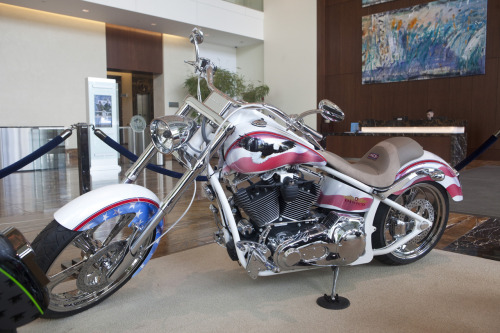
The No Greater Sacrifice bike
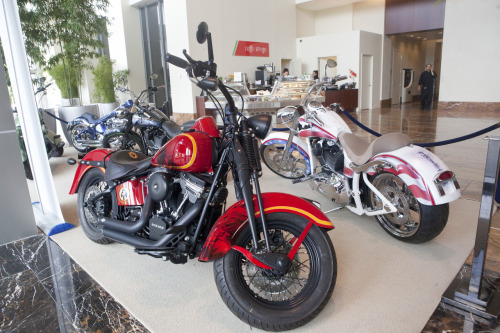
The US Marine Corps bike
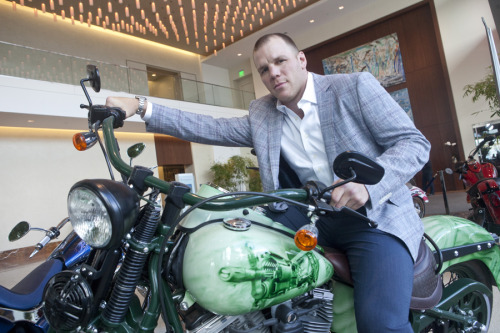
Shawn Thornton on the Airborne Tribute bike
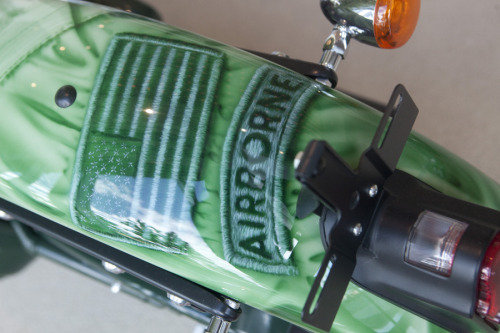
Detail of the Airborne bike
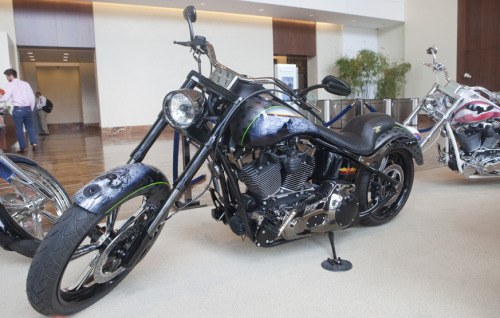
The very cool looking Navy SEAL bike
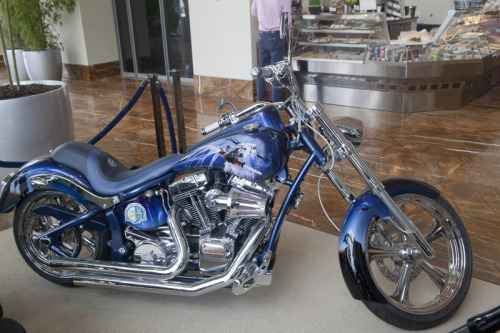
The US Air Force Combat Controllers bike
You can bid on these motorcycles by clicking here.
And to learn more about the event and/or to contribute, you can click here.
"The New England Warrior Benefit will bring together the nation's most celebrated military leaders and region's top influencers for a fundraising gala for five non-profit benevolent organizations that provide critical support and financial assistance to the children, spouses and parents of our elite service members, who routinely perform dangerous acts of valor to preserve and protect the American way of life. "
The five non-profit organizations are:
The Navy SEAL Foundation
The Wounded Warrior Project
The Special Operations Warrior Foundation
The Semper Fi Fund
No Greater Sacrifice
Senator Scott Brown and Mayor Menino will be in attendance, along with numerous esteemed guests as well as servicemen and women.
"The evening's fundraising celebration will be complemented by a one-of-a-kind online auction, featuring five hand-crafted, custom-branded DIRICO motorcycles, each themed to represent a different brand of the United States Military Special Operations Forces."
These are the bikes, which are each powered by a heartbeat Harley Davidson engine...

The No Greater Sacrifice bike

The US Marine Corps bike

Shawn Thornton on the Airborne Tribute bike

Detail of the Airborne bike

The very cool looking Navy SEAL bike

The US Air Force Combat Controllers bike
You can bid on these motorcycles by clicking here.
And to learn more about the event and/or to contribute, you can click here.
Italy 2, Germany 1
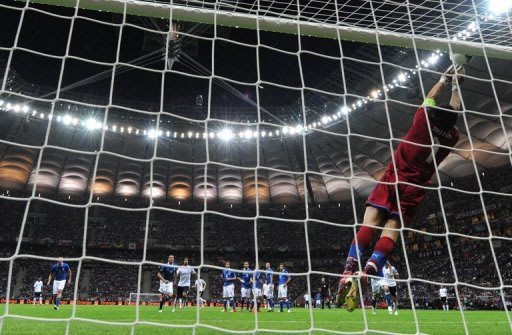
I've heard some say that the German team played better for most of the game. I disagree. Italy's back 4 made tremendous efforts to break up German scoring chances. And keeper Gianluigi Buffon was brilliant. Meanwhile, Germany's defense wasn't even there. The Germans might have been better served to play with no defenders at all.
And starting Bastian Schweinsteiger was a mistake. He was clearly feeling the effects of injury and couldn't keep pace with either the Italians or his teammates.
Even offensively, the Germans looked disorderly and confused, which is unheard of for a German team.
Give credit to teams like Italy and Spain. They've got the right formula to win tournaments. Teams like Germany might dominate early stages, might score 3 or 4 goals per match, but you can't squeeze out close ones against tough opponents without defense.
This was only the second game of the tournament that Italy won in regulation. And they're in the Finals.
Spain vs. Italy in the Finals on Sunday. And I don't care who wins. I'm just a sad German-American today.
Photo Credit:
AFP Photo/Christof Stache
Breakfast With Bobby Valentine, Doc Rivers, Jerry York, and Tommy Amaker

Earlier this week I attended an event at Fenway Park's EMC Club. It featured a discussion panel of four very interesting coaches: Doc Rivers, Bobby Valentine, BC hockey coach Jerry York, and Harvard basketball coach Tommy Amaker. Four men, three different sports, two types of athletes to coach (professional and amateur), and four very different personalities. But all with the same basic job. To coach.
It was moderated by WEEI's Glen Ordway and Michael Holley. It was hosted by the Positive Coaching Alliance, a nonprofit organization that provides workshops and training to coaches at the youth and high school level.
You couldn't ask for a more diverse group of coaches with a broader range of experiences. This "Coffee With the Coaches" breakfast was worth setting my alarm to 4:30 AM, and being so groggy that I forgot to wear a belt with my dress shirt and pants.
Before the discussion even started, the personable and ever friendly Jerry York was mingling with people in the crowd, carrying a plate of sausage and eggs, and as usual smiling. I don't think Coach York is physically or emotionally capable of scowling.

The coolness and honesty of Doc Rivers was evident from start to finish. When asked about learning from other coaches, he admitted that he stole a play from his son's grade school team and used it in the playoffs against Cleveland a few years ago. Paul Pierce scored a layup and the play has since been dubbed "Grade School."
He also talked about being a teammate with Patrick Ewing, who "guilted you into practicing," and how good of a teammate Kevin Garnett is. Whenever the Celtics acquire a rookie, Garnett takes them shopping and buys them two suits.
Michael Holley asked Doc about KG's returning to the Celtics. Rivers nonchalantly answered "Absolutely... I don’t know if Kevin is coming back but let’s just say yes." When Holley pointed out the small forest of media cameras at the back of the room, Rivers didn't seem to care.
Although earlier he joked sarcastically about the media and how much he and other coaches "really enjoy the interview in the 3rd quarter" of playoff games.
Tommy Amaker's directness was clear as a bell. He might be the only person in New England who could drive straight in a rotary. He told a story about when he first took over Harvard basketball in 2007. He assembled the parents of his players for a meeting in the locker room. And he told them what he expected their role to be with the team. He asked that they be supportive of their players, and positive during the game. If they couldn't be positive, they should be quiet. And if they wanted to be negative, they could wait until after the game, then they could speak to him and call him whatever they want.
Every answer he gave was direct and to the point. He quoted an AAU coach of his who frequently stated "We can use you or we don't need you."
He wasn't bland, though. He just didn't evade or sugar-coat his honest opinion.
Then there was Bobby Valentine, the loquacious philosopher. Maybe it was his own reflective nature, or maybe he was feeling the effects of a rain delayed game that had ended only a handful of hours before the event, but he was certainly the most abstract member of the panel.
He quoted the poetically phrased rules of Japanese baseball...
He referred to players on a team who understand what to do in order to win as "disciples" who have fully accepted and understood a figurative "scripture."
He alluded to advice from Casey Stengel, who said "The secret of successful managing is to keep the five guys who hate you away from the four guys who haven't made up their minds."
At such an early hour, his words seemed to wander, but there was no mistaking the fervency and passion behind each response. His words didn't wander because he was being vague or pompous. He was honestly excited about answering each question and giving his opinion.
You'd think with this foursome of different personalities, you might get contradictions. That wasn't the case.
They all agreed that for kids involved in sports, the role of the parent is to support the kid, and to let the coach coach the team. They all agreed that character is an important part of success.
They all talked about important coaches in their own athletic careers, from Doc Rivers' Marine Corps basketball coach to Bobby Valentine being coached by Tommy Lasorda. In fact, when Harvard made the NCAA tournament for the first time since 1966, Tommy Amaker sent Mike Krzyzewski (Amaker played at Duke and was an assistant coach under Krzyzewski) a case of wine. That case arrived when Doc Rivers was in Coach K's office discussing his son Austin.
And they all talked about the role their parents played in their development as athletes. Bobby Valentine's father would try to keep him humble after a big performance by telling him that a "kid in California just scored 7 touchdowns," or that "a kid in upstate New York hit 4 homeruns today." I guess we can see why Valentine is so eager to prove himself.
Jerry York's father was a physician ("Back when physicians did everything from deliver babies to take out kidneys"), and York had 9 siblings, so it was difficult for his parents to be at every game, but they tried.
Doc Rivers' father was a cop and would watch his son play standing in a spot by the door, just under the basket. Years later, a referee confessed to Rivers that his father being armed and under the basket always intimidated him.
Finally there was a question about "losing players."
Bobby V on tactic for dealing with 'lost players'
Coaches are asked questions all the time. They're asked about players, about decisions past and future, about injuries, about why they took Beckett out in the 6th, about why they went for it on 4th down. They're asked about their team, their GM, their job status, their city, their opponent, other coaches.
This event was unique. Coaches were answering questions about coaching. It was a rare chance to learn about what goes on inside a coach's mind.
Definitely worth the 4:30 AM wake up, the drive into Boston, the Mountain Dew, and the breath mints to cover up the Mountain Dew breath.
Bruins and Rask Reach Deal
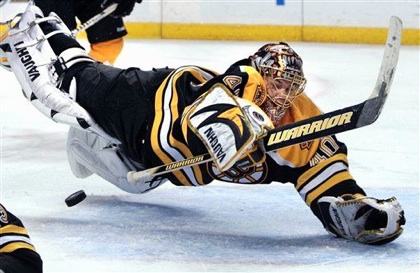
The more I thought, though, the more it made sense.
The Bruins are carrying around $5 million in dead cap money thanks to Tim Thomas' departure. So they aren't able to pay Rask very much. And thanks to the dumb way the NHL cap is set up, they can't avoid this by deferring money to the back-end of the contract. The NHL cap takes total salary, divides by total years, and that's the cap number. Its simplicity only makes things more complicated and stupid.
So when Thomas' contract is off the books, the Bruins will be more able to sign Rask to a legitimate deal.
And this signing makes sense for Rask, too. Was he going to get more than $3.5 million on the open market? I don't think so. He's shown his talent, obviously, but he only started 22 games this past season. In many respects, he's just a step above a rookie.
And young, unproven goaltenders don't get long-term deals for big money in the NHL.
This way, Rask can start in 2012-13, try to play well, and earn a much larger, much longer contract. He's only 25, so he has time to wait for that big payday. And if he does well this year, he'll get it.
He may have gotten a little bit more than a $3.5 million, 1 year deal in the open market. But by playing a full season as a starter, he gives himself a chance to get much much more.
And for the Bruins, they're not overly burdened by his cap hit. And if Rask doesn't work out, he's a restricted free agent in a year and they can part ways.
Everybody wins.
King Felix Rules Over Red Sox

In 9 innings the Red Sox managed 5 singles. Hernandez didn't allow a walk, and he struck out 13.
The only chance the Sox had to win this game was to get Hernandez out of it. And that would have required more than 9 innings. Scott Atchsion allowed the winning run in the bottom of the 9th.
On the bright side, Franklin Morales continues to be sensational. He went 7 innings and only allowed 3 hits. All singles. He struck out 7 and walked 2. In his three starts he's only 1-0, but he's pitched 18 innings, allowed 4 earned runs (2.00 ERA), walked only 3 batters, and struck out 24 (12.00 K/9IP). He's striking out 8 for every batter he walks.
If every Red Sox starting pitcher were healthy right now, it would be difficult to justify removing Morales from the rotation.
There's no shame in being shut down by Felix Hernandez. The Sox can rebound tonight. Aaron Cook faces 2-9 Hector Noesi. Noesi has problems with walks and homeruns. So perhaps David Ortiz can get career homerun #400, or walk #998. That's right, he's 3 shy from 1,000 BBs in his career.
He's 1 for 2 in his career against Noesi. That hit was a homerun.
Photo Credit:
AP Photo
Celtics Make Sensible Selections
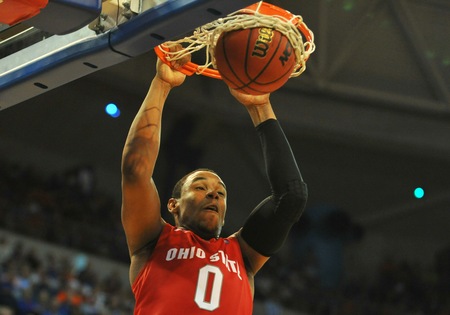
Their picks reflect that optimism. They selected big men with their back-to-back first round picks. These are guys who can fit into a role while Garnett, Pierce, and Rondo lead the way.
With the 21st pick they took Ohio State's Jared Sullinger, who fell in the draft because of back issues. He's 6' 9" and 268 pounds. In two seasons at OSU, he's averaged over 17 points and 9.7 rebounds per game.
The back is a potential worry, but how can you pass on this guy's talent and size with the 21st pick? It is kind of funny how the Celtics were partially undermined in the playoffs by injury issues so now they've added a young player with injury issues. However, if he stays healthy, he can completely change the shape of the game for the Celtics.
The C's are very streaky shooters. Having a big man that can rebound will help the offense get second chances, and help prevent opponents from going on runs by getting more defensive rebounds.
At 268, Sullinger is now the biggest player on the Celtics.
The new tallest member of the Celtics is Fab Melo out of Syracuse. The 7' and 255 pound center has a reputation for effort problems. Who knows how true those issues are and how much they'll translate to the NBA. He's in a good environment, with veteran teammates, and a coach that won't stand for less than 100%. And he needs the Celtics more than they need him.
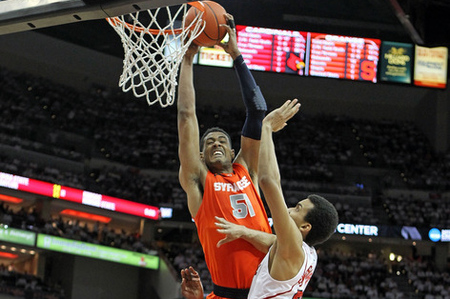
He hauled in some rebounds this past season, which was his sophomore season at SU. 5.8 per game. He also blocked 2.9 shots. That may have been a product of Syracuse's zone system, which had Melo loiter under the hoop like Robin Williams in Jack.
Nevertheless, he can come off the bench and be tall when KG needs a breather. In the playoffs, especially against Miami, opponents drove right down the middle when Garnett was sitting. Put Melo out there, and they'll have a much more substantial obstacle in their path.
In the 2nd round, the Celtics took another Syracuse product, which means ESPN and all the SU Newhouse School of Communication grads at ESPN will probably love the C's this year.
Kris Joseph is a 6' 7" and 215 pound small forward. It seems like he peaked his junior year at Syracuse, as all his numbers went down slightly as a senior. He shot worse from the field, rebounded less, fewer points, fewer assists.
Whatever. In the first round the Celtics added 13 feet and 9 inches of height. They added 523 pounds of bulk. They got bigger. They got better.
Subscribe to:
Comments (Atom)
